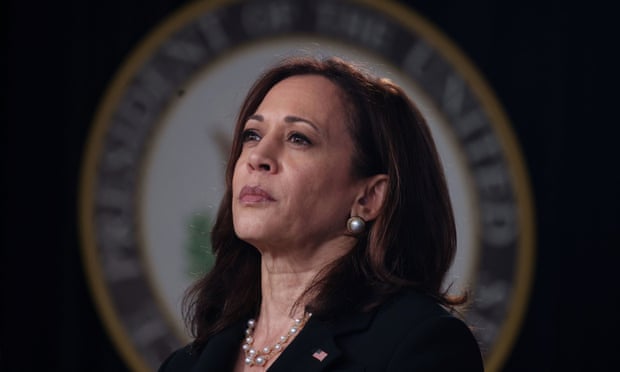Kamala Harris takes on a new role as she heads on her first overseas trip
The vice-president is helping lead Democrats’ efforts to advance a set of voting rights bills after being seen by some as a ‘floater’ in the administration.
When Kamala Harris leaves for her first overseas trip on Sunday, the US vice-president will be doing so with an expanded domestic portfolio.
Last week, Joe Biden announced in a speech that Harris would help lead Democrats’ efforts to advance a set of voting rights bills, a top legislative priority for the party on an issue that disproportionately affects black and brown Americans. The president made the announcement during a speech in Oklahoma on Tuesday, where he marked the centennial anniversary of the Tulsa race massacre, which decimated a flourishing black community.
“To signify the importance of our efforts today I’m asking Vice-President Harris to help these efforts and lead them among her many other responsibilities,” Biden said.
The announcement was partially a result of the vice-president asking Biden a month ago to help shepherd the voting rights bills through congressional gridlock.
“It’s not at all surprising” that the vice-president would be given this role, said Maria Echaveste, a former deputy chief of staff during Bill Clinton’s presidency. “Especially someone of Harris’s profile … given the long history of voting rights and African Americans. It makes a huge amount of sense.”
It also added to Harris’s portfolio which less than a year into the Biden presidency and after major policy initiatives, has been a bit opaque. When asked in an interview in February what her primary issue of focus is as vice-president, Harris responded: “Making sure Joe Biden is a success.”
Roy Neel, a former chief of staff to Al Gore when he was vice-president, has described Harris’s role as a “floater” in the administration.
Harris did work to sell Biden’s stimulus program early on, and more recently has been working on immigration policy for Central America. That assignment has included US aid to the Northern Triangle.
Echaveste said it was “somewhat surprising that [Harris] was given the Northern Triangle/Central America, root causes on migration, because that’s such a difficult task”. But she also described it as “a tremendous growth opportunity”.
Even before he took office, Biden, at times nostalgically, described how he was looking for a vice-president to fill a similar relationship to the one he had under Barack Obama. He wanted someone who he was “simpatico” with, who would be the last person in the room on major decisions. But Harris’s roles have so far seemed comparatively smaller and more specific.
Harris has been a regular presence at major presidential announcements and speeches. But she was not assigned to be the point person on the response to the pandemic, and she has not been the lead negotiator with members of Congress on Biden’s American Jobs Plan or American Families Plan.
Biden, by contrast, was the administration member Obama relied upon to liaise with congressional lawmakers during especially tense moments.
Harris has spent a fraction of the time in Congress that Biden did and thus does not have the deep ties that only a few senators are ever able to cultivate. Biden served in the Senate from 1973 to 2009. Harris was in the Senate from 2017 to 2021.
“The way that President Obama was using Vice-President [Biden] was that he was using him as his emissary to the Senate because of the longstanding ties to the institution and the senators that are there,” explained Andy Winer, a former Democratic chief of staff in the Senate.
“What it appears now is that’s not the way that President Biden is now having Vice-President Harris work on issues. It doesn’t appear that he’s using her as a direct emissary to the Senate or to Congress; he seems to be doing that directly himself. You can see that in the way he’s handling the infrastructure bill.”
Harris aides have been framing her upcoming trip as an opportunity to meet with business leaders and entrepreneurs, and strengthen a multinational approach to try to tackle illegal immigration.
“The goal of the vice-president’s trip to is to deepen our strategic partnership and bilateral relationship with both the Guatemalan and Mexican governments to advance a comprehensive strategy to tackle the causes of migration,” said Symone Sanders, a senior adviser and chief spokesperson for the vice-president.
However, Harris aides have pushed back on the idea that this role includes presiding over the Biden administration’s approach to stemming the flow of illegal immigration through the southern border – something her team sees as an unwinnable assignment.
Harris’s new role as the shepherd of two priority voting rights bills – the John Lewis Voting Rights Act and the For The People Act – is another challenge entirely. Neither bill is certain to pass, despite thin Democratic majorities in both chambers of Congress and Biden’s urgent calls to reverse increasingly restrictive voting laws in Republican-controlled state legislatures.
For Harris, the advantage is as much strengthening her own relationships with lawmakers on Capitol Hill as it is being the face of a push the Biden administration’s needs immediately. And veteran Democratic party leaders say this new assignment for Harris will draw attention to voting rights.
“Putting this in her portfolio will mean this issue will receive a lot of attention,” Donna Brazile, the former Democratic National Committee chairwoman, told the Washington Post.
Harris, in a statement after Biden’s announcement of her added assignment, said that she would be engaging with activists, the private sector and members of Congress to move a voting rights bill.
“The work ahead of us is to make voting accessible to all American voters, and to make sure every vote is counted through a free, fair and transparent process,” Harris said. “This is the work of democracy.”

